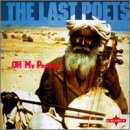The crowd was ready for them at Harbourfront yesterday afternoon, having enjoyed the work of Philadelphia songstress Liz Fields earlier in the day. So when Babatunde’s drum opened the festivities and Umar Bin Hassan, in his usually humourous tone, shouted:
“Niggas is scared of revolution !” The applause could not be contained.
The Last Poets was formed in Harlem, NY in 1968. Abiodun Oyewole, David Nelson and Gylan Kain were the original members of the group, which later evolved to include Umar Bin Hassan, Felipe Luciano, Jalal Nurridin and Suliaman El Hadi.
Their first albums were released in 1970 and 1971. They included the poems they are most known for: "This is Madness," "When the Revolution Comes," "Gashman," and “Niggers are scared of Revolution,” which take on the slackers and the empty words of many in our communities, the fake revolutionaries who are only too ready to “change their hair from black to red to blond and hope like hell their looks will change.” Or to “kill others just because one didn't receive the correct change.” Powerful words, especially in light of the three murders that once again tainted the otherwise peaceful celebrations of Caribana and the Irie Music Festival this weekend.
The afternoon’s performance was punctuated by the poem “America is a terrorist,” which Oyewole joked he might as well perform here because he would be arrested for doing so elsewhere.
Going through the list of his country's crimes, he spoke of the destruction of the Florida town of Rosewood, the burning of Black churches in Alabama in the 1960s, the infiltration and eventual extermination of the Black Panther Party and the modern-day wars on abstract nouns. “Where were you, Condoleezza?” Oyewole asked as Babatunde’s drumbeat caressed the words, and Bin Hassan mumbled, “Terrorist! Terrorist!” in the background. In the crowd, many fists were raised, and laughter ensued as many grasped the irony of the statement: Condoleezza Rice, born in Alabama in the 1950s, was now a peddler of ideology for the Empire.
The Last Poets also spoke about the state of hip-hop and its impact on the youth of the world, which they witnessed after having just returned from a trip to South Africa. “Hip-hop is a great vehicle, but right now, we got some crazy drivers,” Oyewole observed. Asked about it after the show, Bin Hassan took comfort in the work of “some conscious brothers who are doing good things: Kanye West, Common and Dead Prez.” Tracks like Be and Real People from the latest Common CD indeed pay tribute to the great ones who laid the tracks so his train of thought could ride through.
But as I left Harbourfront, the words “Unity, Unity” (from the Last Poets’ My People published in1996) kept coming back to me as reminders of the unfinished work:
|
“Unity! Unity! |
|
It's a restatement or maybe a reference to Bob Marley's rallying cry from the song Africa Unite.
“It's later, later than you think
Unite for the benefit of your people
Unite for the Africans abroad
Unite for the Africans a yard.”
And that was 25 years ago.
Eloi Minka is one of the founders of AfroToronto.com


